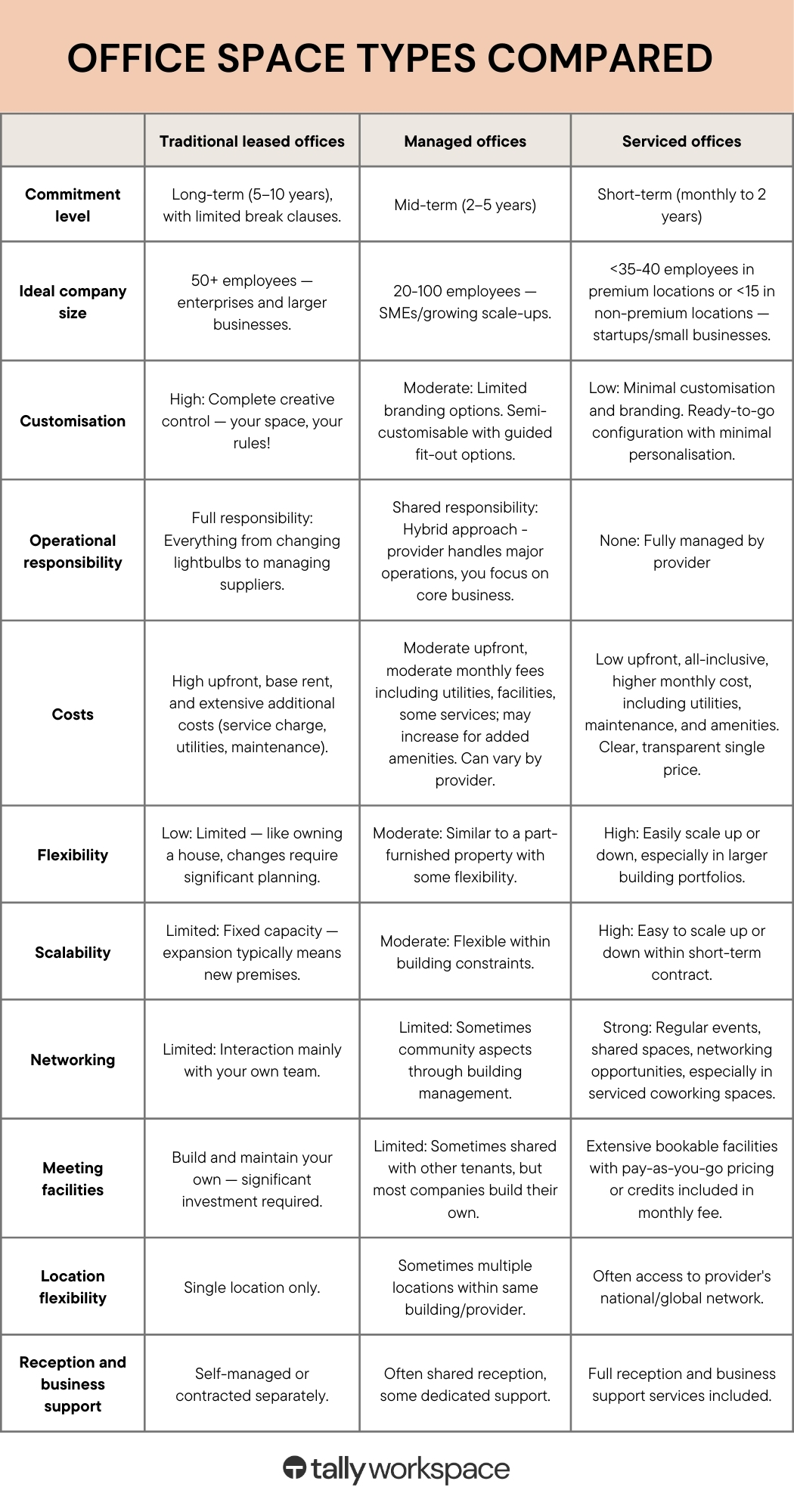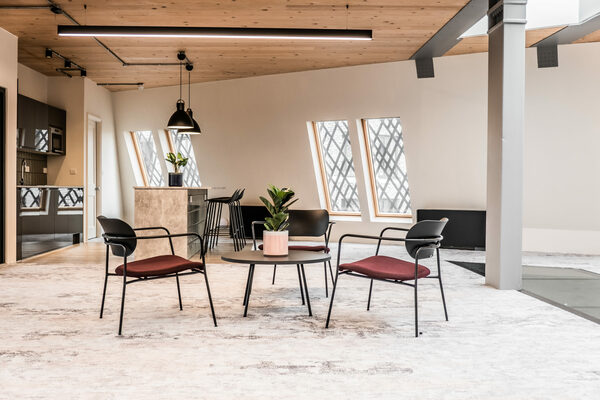Choosing the right office space can feel like a big decision — because it is.
Whether you’re
gearing up to move after outgrowing your current office, preparing for a
lease to end, or setting up a space for the first time, finding the right fit is key to setting your team up for success.
But with so many options — managed, traditional, or serviced — it can be tricky to figure out what works best for your business.
Each option comes with its own perks and challenges, and can significantly impact your business’s operations, finances, and scalability, so knowing the differences is crucial.
In this guide, we’ll break it all down for you — after all, we are experts on office spaces, so we know what works.
From long-term leased spaces to plug-and-play serviced offices, we’ll help you make sense of your choices, weigh up the pros and cons, and land on the perfect space for your team.
Why the right office space matters
Choosing the right office space isn’t just about where your team works — it’s about how they thrive.
The right environment can boost productivity, reinforce your brand’s identity, and keep your employees feeling happy and supported.
A well-chosen office can also give your business room to grow, with the flexibility to adapt as things change.
Plus, when operational tasks like maintenance or utilities are handled smoothly (or even taken off your plate entirely), you can focus on what really matters: building your business.
Whether you’re after creative collaboration, quiet focus, or a bit of both, the right space sets the tone for success.
What are traditional leased offices?
Traditional leased offices are long-term spaces rented directly from landlords, giving businesses full control over their workspace.
These leases usually run for 5–10 years, making them a great fit for companies with stable growth plans and a clear vision for their office.
While this option offers unmatched customisation — you can design the space exactly how you want — it comes with higher upfront costs for fit-outs, furniture, and deposits.
Plus, you'll be responsible for managing utilities, maintenance, and repairs.
Traditional leased offices are typically better suited for established companies with stable growth projections, due to the substantial upfront costs and long-term commitments.
Key features of traditional leased offices
-
Commitment: Leases often last 5–10 years, offering limited flexibility.
-
Customisation: Complete control over design, layout, and branding.
-
Costs: High initial outlays for fit-outs, furniture, and potential deposits.
-
Unique benefit: Full operational responsibility, including utilities, maintenance, and repairs.
-
Best for: Established enterprises seeking complete control and willing to commit long-term.
What are managed offices?
Managed offices strike the perfect balance between flexibility and control, offering a tailored workspace without the full responsibility of traditional leases.
These offices are designed to reflect your brand, with providers taking care of the day-to-day essentials like utilities, maintenance, and even some operational support.
Contracts are typically shorter than traditional leased office space contracts — around 2–5 years — making them a smart choice for growing businesses that need a bespoke setup but want to avoid the upfront costs and hassle of managing the space themselves.
Managed offices are better suited to mid-sized companies looking for a balance between autonomy and convenience, without the headaches of property management, and an office space they can customise to reflect their brand identity.
Key features of managed offices
-
Commitment: Shorter terms, typically 2–5 years.
-
Customisation: Moderate; businesses can often add branding and make some design adjustments.
-
Costs: Lower upfront costs compared to traditional leases.
-
Unique benefit: Providers manage operational tasks, allowing businesses to focus on their core activities.
-
Best for: Scale-ups who want their own identity and space but want to focus on their core business not property management.
What are serviced offices?
Serviced offices are the plug-and-play office space solution for businesses.
These fully equipped workspaces come ready to use, with everything from furniture to internet and cleaning already sorted.
Perfect for teams that value flexibility, serviced offices offer short-term contracts — ranging from a few months to a couple of years — and transparent, all-inclusive pricing that covers rent, utilities, and amenities.
Beyond convenience, they’re great for networking, with shared spaces and events designed to foster collaboration and community.
Plus, businesses in serviced offices can often benefit from the office space provider’s national (sometimes global!) network of other office spaces — ideal for employees who travel.
Serviced offices are generally best for startups and small businesses looking for a hassle-free way to hit the ground running that they can scale up as their business grows.
Key features of serviced offices
-
Commitment: Contracts range from a few months to a couple of years.
-
Customisation: Limited customisation, since serviced offices usually come fully furnished and equipped with utilities, internet, and cleaning services.
-
Costs: All-inclusive — pricing covers rent, utilities, and amenities, offering transparency.
-
Unique benefit: Shared spaces and events foster collaboration and community.
-
Best for: Startups, small companies and rapidly changing teams needing some flexibility.
How to choose the right office space for your brand
Choosing the right office space for your brand requires careful consideration of your business needs, budget, and team culture.
After all, your office isn’t just a workspace — it’s a statement of your brand’s identity and ambition.
So take your time to weigh these factors, and you’ll create a space that works for your business now and in the future:
-
Team size and structure: Small teams (<15 people) often thrive in flexible serviced offices, whereas larger teams or those planning steady growth might benefit from managed offices or traditional leases.
-
Business growth plans: Are you scaling rapidly or staying steady? Managed offices offer room to grow, while leased spaces suit stable, established teams.
-
Budget: Evaluate your ability to manage upfront costs versus monthly expenses. Can you handle high upfront costs (fit-outs, deposits) for a leased space? Or do predictable monthly payments (common in managed and serviced offices) better suit your finances? And if you want to get an idea of what to expect, we’ve got you covered in our comprehensive Office Pricing Guide, or in our London-specific breakdown.
-
Operational needs: If you want to focus entirely on your core business, rent managed office space or a serviced office. Do you want full control over utilities, maintenance, and day-to-day operations? If not, a managed or serviced office lets you focus on your business while providers handle the rest.
-
Branding and customisation: Leased offices offer maximum customisation but require a bigger commitment. Managed offices allow for tailored branding without the full operational responsibility.
-
Team culture and preferences: Do your team members need collaborative spaces or prefer private offices? Consider commuting distances and how the location supports your team's work-life balance.
Choosing an office space is a big decision, but it doesn’t have to be overwhelming.
Whether you’re drawn to the flexibility of serviced offices, the tailored appeal of managed offices, or the control of traditional leased spaces, the key is finding the option that aligns with your business needs and goals.
Think about where your team thrives, what your budget can support, and how much time and energy you want to spend managing the space.
If you’re unsure where to start, tools like our
Find an Office Guide can help you navigate the process.
Your office space is more than just a workplace — it’s where ideas come to life, relationships grow, and your brand shines.
By carefully weighing your options and leaning on expert advice when needed, you’ll create an environment that not only works for your business today but sets you up for success tomorrow.
Whatever stage your business is at, the right space is out there, and we’re here to help you find it.
.jpg)
.jpg)
.jpg)




